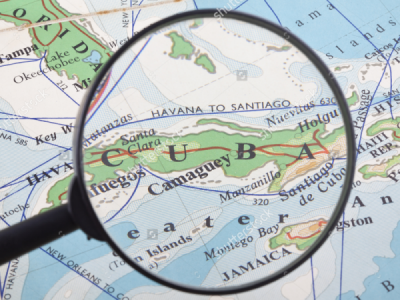
Posted on July 7, 2016
By Greg Miller, Fairplay
Under current U.S. law, a vessel — regardless of flag — can’t call at a U.S. port within 180 days of calling in Cuba.
The 54-year-old U.S. ban on trade with Cuba is unlikely to be lifted in this election year, but the long-awaited policy reversal finally could come to pass after the next Congress and president are sworn in.
When the embargo is repealed, plans are in place to transform Cuba’s Mariel container terminal into a major transshipment hub that would serve Gulf of Mexico ports, according to TC Mariel General Director Charles Baker.
Skeptics of the Mariel development say the port’s location on the far northwest coast of Cuba is in the wrong location for transshipment. Container ships from Asia that transit the Caribbean en route to the U.S. East Coast usually sail through the Jamaica Channel, with hubs to the west at Kingston and to the east at Caucedo in the Dominican Republic.
The ships then continue northward through the Windward Passage, a strait that skirts Cuba’s southeastern corner, near Guantanamo, before sailing onward past the Bahamian transshipment hub of Freeport.
Skeptics say the sailing time required to divert from this route to call at Mariel would render the Cuban facility uncompetitive versus established Caribbean hubs.
Baker, however, laid out a plan that would allow Mariel to use its location to its advantage. In a presentation at May’s Caribbean Shipping Executives’ Conference in Cocoa Beach, Florida, he explained that Mariel aims to be the first port of call for new Panamax container vessels after they transit the expanded Panama Canal on the their way to the U.S. East Coast.
Individual feeder services then would provide direct connections from Mariel to the Gulf ports of Tampa, Mobile, New Orleans, Houston and Altamira, Mexico. “It will be a challenge to attract the bigger vessels (that will serve the region after the Panama Canal expansion) to circle into the Gulf, because there would not be enough time in the schedules,” he said, explaining why carriers would prefer to use a hub-and-spoke system to serve Gulf ports.
Dropping cargo off in Mariel and feedering it to Gulf ports also would be more attractive to shippers, given the “vastly improved” transit times, Baker said. “Today, to ship to Mobile, you’ll have to wait for the vessel to sail in and out of Houston and New Orleans before it gets there,” he said. “When we talk to the carriers and the ports, they do recognize (the advantages of) our geography, but they also recognize very clearly that the U.S. embargo stands in the way of the opportunity we have here.”
Baker also confirmed that Mariel could develop a transshipment business even before the U.S. trade embargo is lifted, assuming the so-called 180-day rule is repealed. Under current U.S. law, a vessel — regardless of flag — can’t call at a U.S. port within 180 days of calling in Cuba. This effectively discourages transshipment from Mariel because any vessel deployed for feedering would lose the ability to call in the U.S. for an extended period. More importantly, mainline vessels can’t sail to final destination in the U.S. after dropping off transshipment cargo bound for non-U.S. destinations in Mariel.
A repeal of the 180-day rule “would allow us to enter the international transshipment market,” said Baker, who recently returned from a trip to Washington, where he met congressional staffers and lobbied for an end to the rule.
“Right now, services may go from Brazil to Mariel to Europe,” added Cargo Urriola, senior vice president of Seattle-based terminal operating company Carrix. “If the six-month restriction was lifted, ships going to Mariel could go on to Miami and Port Everglades, and cargo left in Mariel could be picked up by a feeder (for delivery to non-U.S. destinations), which would mean better utilization” for carriers.
“Unfortunately, the 180-day rule remains in place, but we are trying to encourage those in Washington to do something about that,” Baker said. “It seems that when the changes take place in January (after the elections), either one of the (candidates) that takes over is thinking along the same lines (about Cuba trade), which is very encouraging for us — and the Caribbean.”
Source: JOC.com





